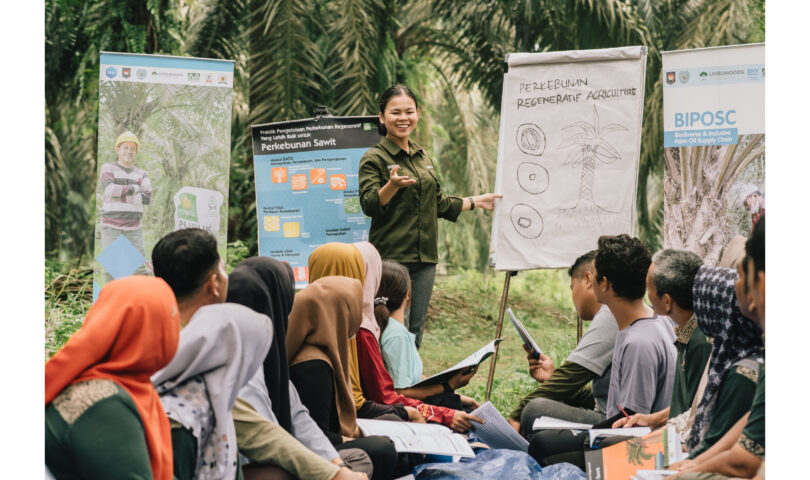JAKARTA, Indonesia, Oct. 17, 2024 /PRNewswire/ — Musim Mas Workforce, the Livelihoods Investmrent for Community Farming (L3F), SNV Indonesia, and Global Agroforestry (ICRAF) are participating to toughen the data and power of separate oil palm smallholders during the Biodiverse & Inclusive Palm Oil Provide Chain (BIPOSC) undertaking.
Regenerative Agriculture at a Press Convention in Jakarta, Indonesia on 17 October 2024
The undertaking started in 2021 and takes a long-term method to maintain a deforestation-free provide chain, regenerate degraded land, repair native biodiversity, and toughen the livelihoods of separate smallholder farmers in Labuhanbatu, North Sumatra. BIPOSC will accomplish that via enforcing regenerative agriculture, in the neighborhood tailored agroforestry fashions, capacity-building for sustainable companies, and others.
The separate palm smallholders participating up to now won complementary coaching from Musim Mas. Following the educational, those smallholders shaped a smallholder’s affiliation, Labuhanbatu Detached Oil Palm Smallholders Affiliation (APSKS LB), North Sumatra. Musim Mas encourages smallholders to method associations to recover get admission to to assets and acquire certification through the Roundtable on Sustainable Palm Oil (RSPO) and Indonesian Sustainable Palm Oil (ISPO).
“Musim Mas has long saw that smallholders are key to achieving palm oil sustainability, and that’s why we lead Indonesia’s most extensive smallholder program. We believe that the way forward is to collaborate with more partners to achieve a wider impact. With our BIPOSC partners, we hope to advance the skills and knowledge of smallholders through regenerative agriculture and related techniques. Regenerative agriculture and agroforestry have the potential to help smallholders be part of a sustainable palm oil supply chain. It could help them develop alternative sources of income, especially during the replanting period where their palm oil crops are unproductive, typically for three years,” mentioned Rob Nicholls, Common Supervisor, Tasks & Methods, Musim Mas Workforce.
Within the face of order trade and threatened biodiversity, regenerative agriculture can play games a task for tiny farms as it maintains landscape fitness, prevents erosion and H2O runoff, and will probably drop greenhouse fuel emissions and nitrogen leakage.
“As a global development partner organization, SNV aims to support Indonesia in achieving its Sustainable Development Goals (SDGs). To achieve this, we need to implement effective and impactful programs to transform agricultural and food systems, energy, and water. In the BIPOSC program, we promote a comprehensive regenerative agriculture and agroforestry model to maintain soil fertility and biodiversity, providing maximum benefits for farmers’ livelihoods and economy,” mentioned Rizki Pandu Permana, Nation Director of SNV Indonesia.
The important thing regenerative agriculture tactics taught come with the applying of bio-input, mulching to offer protection to topsoil, planting secure vegetation, built-in pest control that reduces the desire for chemical insecticides, and alertness of compost that reduces the volume of chemical fertilizers wanted. To time, 1,032 separate smallholders won coaching and enforce those tactics on their farms, representing a complete land with a complete branch of one,063.68 hectares. The undertaking educated 25 village facilitators to serve hands-on aid to smallholders, and 7 demo plots established as pilot disciplines and studying amenities for regenerative agriculture.
“When I visited palm oil smallholders a few years ago in the area, their biggest concern was access to more fertilizers. While fertilizers play a key role in boosting yields, there was a noticeable gap in understanding how to protect the soil from long-term degradation. Smallholders needed more knowledge about maintaining soil health, preserving soil structure, and other critical factors. This is exactly what the BIPOSC project aimed to address, and we’re pleased to see that the farmers involved are now reporting not only higher yields but also healthier soils on their plots,” mentioned Bernard Giraud, President & Co-Founder, Livelihoods.
The projectalso seems into capacity-building. Along with house composting, the undertaking enabled the native farmer affiliation, APSKS LB, to form and lead a composting unit with a power of 100-150 lots/time. Generating compost at scale with inputs from within sight turbines and farmer plots, the unit offer compost to member farmers at part of standard marketplace costs. In 2023, its first era of operation, the unit produced 588 lots of compost, and generated a benefit of IDR 421 million. The undertaking companions consider this can be a type that may be replicated in other places.
“One of the most impactful outcomes of this project for smallholders is the Composting Unit as the business model around it. It enables smallholders to obtain compost affordably, and the profits are shared among member farmers. This is a practical solution to promote the adoption of composting, and all ASPKS-LB smallholders are now using compost in their plots,” mentioned Syahrianto, Chairman of the Labuanbatu Detached Oil Palm Smallholders Affiliation.
As of 2023, separate smallholders lead about 41% of oil palm planted disciplines in Indonesia, representing 6.94 million hectares. This determine is anticipated to extend to 60% through 2030, making tasks like BIPOSC crucial in shaping the month of sustainable palm oil manufacturing.
Devane Sharma
[email protected]
SOURCE Musim Mas Holdings
WANT YOUR COMPANY’S NEWS FEATURED ON PRNEWSWIRE.COM?
440k+
Newsrooms &
Influencers
9k+
Virtual Media
Shops
270k+
Newshounds
Opted In



